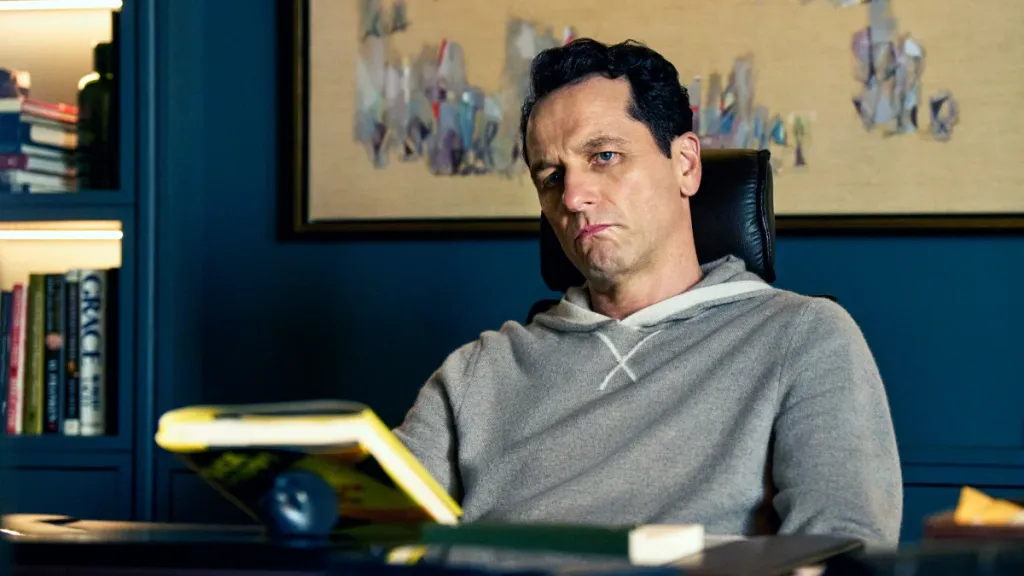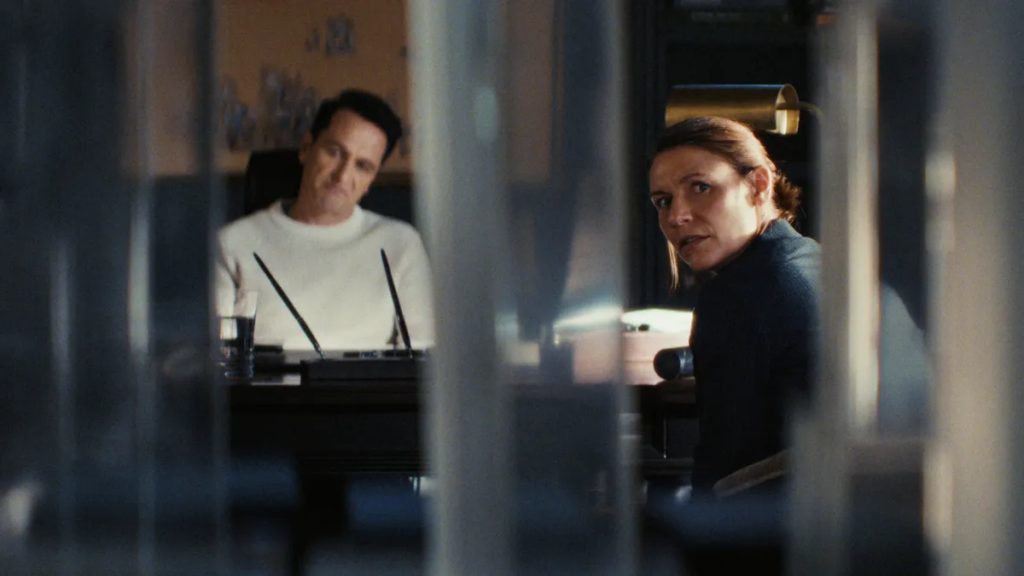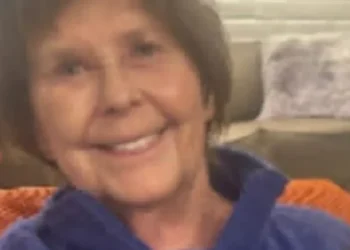Note: The following story contains spoilers from “The Beast in Me.”
“The Beast in Me” ups the cat-and-mouse game between Claire Danes’ Aggie Wiggs and Matthew Rhys’ Nile Jarvis with a heart-pounding twist in Episode 6, when, upon learning that Aggie is onto him, Nile places an ungodly piece of evidence in the same room where he and Aggie had a drunken heart-to-heart just days before: The dead body of Teddy Fenig (Bubba Weiler).
The discovery of Teddy’s dead body not only confirms Aggie’s suspicion that Nile was involved in his disappearance, but now places her at the center of a police investigation, reaching a level of fear that Danes revealed was quite stressful to generate. “It was just so grotesque,” Danes told TheWrap. “It was scary to put myself in that imagined circumstance — it really was rather unpleasant.”
“When I read that, I was like, ‘Oh my god, the depths of the recesses of their brains, where they pull that from’ — I’ve never seen anything like,” Rhys added, while Danes noted, “It’s so hateful. It’s so cruel.”
Danes noted the discovery was also a shocking betrayal from Nile, whom she had confided in about her son’s death just days before, saying “I don’t think she’d ever been as vulnerable with anyone as she had been with Nile in that bedroom.”
The discovery sets Aggie on the run, desperate to expose Nile as the murderer she knew he was to whoever she still had a bargaining chip with. Luckily, the last person she turned to before her arrest, Brittany Snow’s Nina Jarvis, was in fact her saving grace, with Nina pulling out a confession from Nile for killing Madison, recorded it and sent it to the police.
After the dust settles from Nile prosecution and Aggie’s book published, Aggie meets with Nile one final time in prison in a scene Rhys said is indicative of their relationship.
“She’s happy to see him after all of that,” Danes said, laughing. “She’s disgusted by what he’s done, genuinely, and I don’t know. She can’t quite shake him and she’s still exploiting him … there’s a lot that’s wrong about all of it.”
‘That’s what I loved about that final scene is that it’s indicative of their relationship — there’s still so much unsaid, but then ultimately, not unsaid, but certainly still mess on the table,” Rhys said. “It’s not gift wrapped by any means at the end, which I loved.”
It’s as much as a resolution as Aggie — and audiences — will get, however, as Nile is killed by a fellow inmate upon the instruction of Uncle Rick. Below, Danes and Rhys unpack how they built their characters’ unusual dynamic and reveal whether they would jump into multi-season TV again. This conversation has been edited for length and clarity.
TheWrap: Claire, this project has been near and dear to you from the start. What were some things you wanted to make sure the show got right and what was it like reuniting with Howard Gordon?
Danes: Jodie Foster was going to direct it initially — she brought it to me. We’ve known each other for a while and I thought the pilot was brilliant. I loved the milieu and I loved the premise, and felt kind of Hitchcockian in an enjoyable way. I really loved this character who was kind of inaccessible, very remote and introverted and brilliant and and also had this rage roiling beneath that surface. And I’d never really seen a dynamic like this before between these two characters, it was like a perverse romance, in a way, and I just thought it was really psychologically rich.
It went through quite a few different iterations over the years, and eventually I turned to Howard, just to help find its ultimate shape — he’s very good at that. That was so wonderful to be able to call on my friend who is, obviously, is crazy gifted and really knows how to keep people watching.
How did you both start developing that relationship between Aggie and Nile? What do you see at their core that brings them together?
Rhys: What helped as much as it terrified me enormously was the second day for me was that 10-page lunch scene we had, which, at first I was like, “that’s a terrible idea. You can’t make us do that,” and then it informed so much and cemented a number of things. We had been lucky to have a week’s rehearsal where I think we embedded a lot and laid down a lot of foundation work. But it was really from … getting to play a scene with this one, many things happen. First of all, you realize very quickly this insane gymnastic ability to turn on a word [that] makes you go, “Oh God, I need to turn up here now.” But it also informs, I felt, who those two people were very quickly, so as hard as it was, [it] helped enormously set a tone for their relationship.
Danes: They have a lot of fun with each other. The whole series is about them talking to each other, which you just pray that that works and holds people’s attention, which our writers did a brilliant job of crafting these wonderful sentences for us … And that scene in particular felt like a little play, to have that scope, that space to just goof around.
Rhys: I think it’s the hardest thing in the world to write two people talking and that can kind of roller coast to that degree of enormous sweeps from humor to menace to rage within very short distances … [it’s] incredible to read and terrifying as an actor who’s going to have to perform it, but one hopes is immensely interesting to watch.
Danes: They’re both incredibly perceptive. They were challenging each other, and I think they just took pleasure in the sport of that.
In this case, attraction is out of the question and any romance is off the table. What layer or lack there of does that add to their relationship?
Danes: I thought it was wonderful — this idea of the darkest part of yourself suddenly becoming animated in another human. It’s almost like she’s in conversation with a part of herself that she can’t admit to, and narcissists are very good for that. He’s this outsized, wild, indulgent character who permits us to recognize the parts of ourselves that are wrapped in shame.
Rhys: Yes, they free each other. Also, I think the taking off of the table of the physical element to it frees it in a way. I felt it became a lot more honest quickly, because you remove that element, you go, “Well, now it’s just two of us in our lives and what we have to say about each other and ourselves.”
There was part of me that wanted to believe Nile was innocent. Matthew, how did you want to play Nile in order to walk that line?
Rhys: It’s the age old adage that you look for the justification in your character, regardless of what they’ve done. There was real conviction in that he was wronged in many aspects from the very beginning of his life, because the way his father treated him or the cards that life dealt him and there was a degree of what he did was possibly out of his control. Therefore, there was a shirking of responsibility, so I found that in him — there’s real conviction and commitment to the fact that a lot of what happened wasn’t his fault, and then that makes your linear journey a little easier to play.

You both starred in acclaimed shows that not only ran for several seasons, but kept the quality high during all that time. There’s been a trend recently of shows ending after only a couple seasons or, like “The Beast in Me,” a limited series. Does digging into a character across several seasons still appeal to you at this point in your career?
Danes: The hardest and gnarliest part of finding a character are those early days, and there’s a real ease that comes with having established the thing and to have created your culture with your team of collaborators. After a certain point on “Homeland,” I lived my backstory — It was in my nervous system, so I found that to be really helpful, and I would love to experience that again. Did you find that?
Rhys: Oh, yeah, it was a real luxury.
Danes: It was so fun, and it didn’t ever get boring. I thought it would, but it didn’t.
Rhys: We were all very lucky with the writers we had. The evolution continued. It never got to the moment where we were going, “Ah, I feel like we’ve done this.” It just evolved.
Danes: When I finish a show like this, I’m like, “all that, now I know how to do it!”
Claire, would you be interested in playing Aggie again? Maybe for her next book?
Rhys: I think this is where you take off from “Murder, She Wrote” and Aggie becomes a long-running Lifetime series where you play Aggie Wiggs just solving murders, one book at a time.
Danes: She moves.
Rhys: New city. New murder.
Danes: New neighbor.
Rhys: Oh, very good. Oh, my God, this is going to pitch itself.
Danes: “Aggie in Miami.”
“The Beast in Me” is now streaming on Netflix.
The post ‘The Beast in Me’ Stars Claire Danes and Matthew Rhys Break Down ‘Grotesque’ Episode 6 Twist, Aggie and Nile’s ‘Freeing’ Relationship appeared first on TheWrap.





